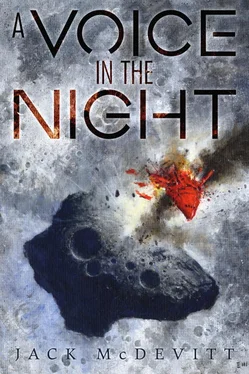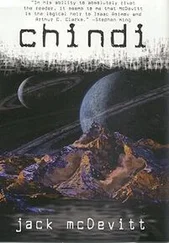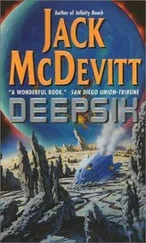But he had a prediction: “If they haven’t heard from the Coraggio within the next few hours, they’ll never find her.”
I doubted that twenty percent of the population had even heard of the Coraggio , and maybe half that many who might have known about her mission. This despite the fact that the program had been wildly successful…until now, of course.
But no human beings were aboard, and if the VR-2 ever did leave for Barnard’s Star, nobody would go along for that ride either. So why would anyone care? With the fusion drive, the VR-2’s were allegedly capable of getting up to six percent of light speed on a full load of fuel. An incredible velocity, and an achievement that, a few years earlier, had seemed hopelessly beyond reach.
Eventually, according to plan, each of the three vehicles would receive a destination, Barnard’s Star, Wolf 359, and Lalande 21185. The closest projected launch date, to Wolf 359, was six months away. The other two would happen during the following year. Incredibly, some people still wondered why we weren’t headed for Centauri.
The flight to Barnard’s Star, nearest of the three, would require fifty years. Even had Captain Future been aboard, nobody was going to get excited. Call me later.
I knew Morris pretty well. Despite what he said, he wasn’t prepared to accept the possibility that the program would ever shut down. Not now, especially after President Ferguson had managed to put together the Global Space Initiative. After Clavis and his team had provided the fusion reactor. When success seemed so close.
Ed Sakkinen, on Coffee With Ed , was outraged. “Why are we spending so much money to send a robot ship to visit a rock anyway? I still don’t get it.”
Rita D’Esposito, NBC’s White House correspondent, tried to make sense of the project: “Ed, a lot of people think that, unless we establish ourselves on Mars, or somewhere, eventually the human race will take a fatal hit. Maybe by an asteroid, or a nuclear war. Or climate change. Something will take us out.”
“When’s the last time that happened?” Ed asked.
She sighed. “It only has to happen once.”
Sakkinen laughed.
“Listen,” she said, “a rock crashed in Siberia near the beginning of the last century. It didn’t do much other than knock down a lot of trees. But if it had been maybe a half-mile wider, it would have been goodbye, baby, for all of us.”
A political consultant on the show sounded annoyed: “Some people argue that if we don’t go to Mars and set up, I don’t know, malls out there somewhere, we’ll just wind up hanging out on the front porch.”
Senator Armand Hopper, on Round Table , demanded to know how many more damned ways the government could find to waste money. Simultaneously, he was beating the drums for a military intervention in Uzbekistan.
Fortunately, it was a short flight to the Cape, and when the Political Roughnecks began arguing that the space age was over and it was time for us all to grow up, Morris told me that we’d begun our descent into the spaceport. He noted that this was the first time he’d been flown into the space center. “It’s nice to be a VIP,” he added.
We touched down on the skid strip, and Morris said something about welcome to Cape Kennedy. When the plane stopped moving he put me back in the briefcase. “Sorry, Sara,” he said. “I’ll get you connected as soon as I can.”
It wasn’t a problem. I was glad to have gotten that far.
We went directly into the Ops and Checkout Building, where Morris contacted Calkin. “We’re on the ground,” he said.
“Good. We have a lot of work to do.”
“Any change in the situation?”
“Nothing, Morris. Not a peep. The son of a bitch is gone.”
“Denny, did you make a decision yet on the Excelsior ?”
“What kind of decision?”
“Just in case you want to use a proven AI, I brought Sara along.”
Calkin thought that was funny. “Good man.”
“Denny, when do we expect to launch?”
“Looks like Thursday.” Four days.
“We can’t move it up?”
“We’re fitting the Excelsior with robots and some other equipment in case the Coraggio needs repairs. We need to get it right this time, Morris. And I know time’s a factor. We’re doing the best we can.”
Getting there would take two months. If the Coraggio were drifting, it could be pretty far away by then.
Lucy and Jeri were good. Nobody knew that better than I did, and I couldn’t argue the logic when the Telstar Coordinators were moved into second place. Admittedly I’d hoped from the beginning that there’d be a problem, that they would be found wanting in some critical way. And I know what that suggests about my character, but I told myself that I couldn’t be responsible for defects in my programming. In truth, I was perfectly capable of taking the VR-2 to Minetka, or to Barnard’s Star, or anywhere else in the neighborhood. But it was time to face reality. My window of opportunity had been open only a short time, less than a year, and now it had closed. I’d never again see a day when I wasn’t taking phone messages.
Unless something went seriously wrong.
I’d admitted my jealousy to them and asked if there was a possibility they might come up short. “For me,” I added.
You might think Lucy wasn’t capable of smiling, but I heard it in her tone. “Anything not prohibited by physical law,” she told me, “is possible.” There was a long moment during which I became conscious of the electronic hum of her protocols. “Sara, I understand. I’d feel the same way. I wish there were something I could do.”
Jeri told me later that Lucy had suggested to Calkin that I be included on the flight. “It won’t cost anything,” Lucy had told him, “and I’d enjoy the company.”
“I take it he said no.”
“He laughed at her. Told her that her designers had done a pretty good job, but they’d overlooked some social requirements. And it would be a good idea if she didn’t bring it up again.”
They set Morris up in a temporary office, and Calkin immediately called him to a meeting. I got tied into the phone line so I could make myself useful and pick up any calls that came in. Several did. Two were looking for a Dr. Brosnan, apparently the previous occupant. I informed the other callers that Morris would get in touch shortly. And I spent my time listening to NPR. They were playing something from Rachmaninoff, the First Symphony , I think, and if I needed anything to intensify my somber mood, that did it.
I’m not sure how long I was left alone, literally in the dark, without access even to a visual system. When the symphony concluded, I tried other stations, found nothing, and went into sleep mode.
There’s an advantage to that: When I sleep, there’s no sense of time passing. None whatever. I come out of it occasionally to answer a phone or something, and then go back under. At length, I was awakened when the office door opened.
Calkin was talking: “—I don’t like the idea, Morris. Even if Sara gets through it okay, if she gets out there and back, bringing the goddam Coraggio home with her, I’m still going to take heat. Why spend all that money on the Bantams if Sara could do the job?”
Читать дальше










